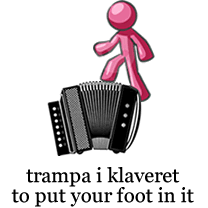
The other day I learnt an interesting Swedish idiom – nu trampade jag verkligen i klaveret, which means “I really put my foot in it” or literally “now I really stepped (heavily) on the accordion / piano / keyboard”.
According to the Svenska Akademiens Ordböcker, trampa i klaveret means “göra en social tabbe” (to make a social mistake). Apparently it comes from the phrase “Det låter, sa bonden/klockaren, trampade i klavere” (It sounds, said the farmer / watchman, like trampling on the keyboard” [source].
To put one’s foot in it means “to say or do something tactless or embarrassing; commit a blunder or indiscretion.” [source]. The origins of this phrase are not known.
Other idioms involves musical instruments, or instrumental idioms, include:
- rhoi’r ffidl yn y to = to give up / throw in the towel (“to put the fiddle in the roof)
- to play second fiddle = to take a subordinate position to someone was is more important
- to blow one’s own trumpet = to boast about your own sucesses
- to blow the whistle (on sth/sb) = to report illegal / unacceptable activities
Do you know any more?
I take issue with the title of this post: “Instrumental Idioms.”
At least for Slavic languages (and aren’t you studying one or more of them?), the “instrumental” is an important case. As it stands now, your title misleads by promising idioms that make use of the instrumental – which per se would be a quite legitimate and interesting language-related subject. The curious reader clicks through and discovers the true meaning was something much more on the trivial side.
I hadn’t thought of that alternative meaning for instrumental idioms before you mentioned it. If you have any examples of idioms that use the instrumental case in any languages, do share them, so that people looking for them will find them. Thanks.
I am learning Czech and Russian at the moment, you’re right, and have learnt some Slovak, Slovenian and Serbian in the past.